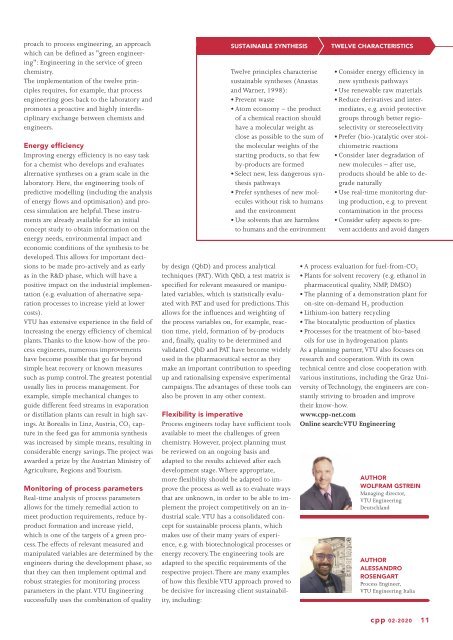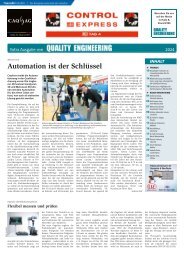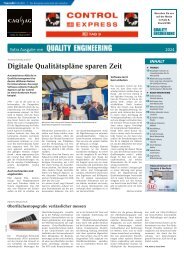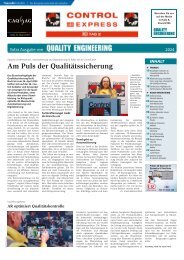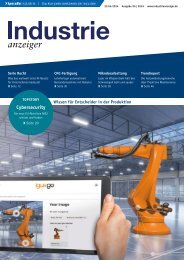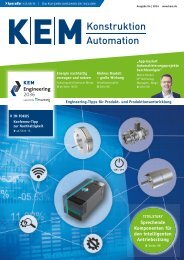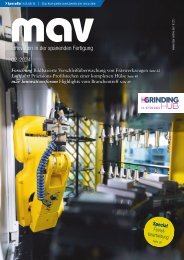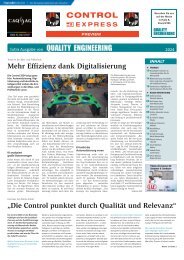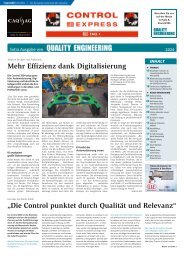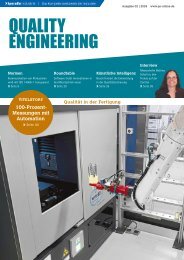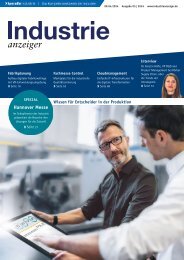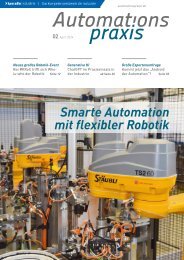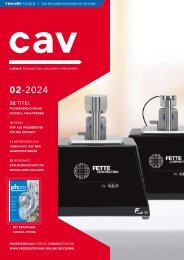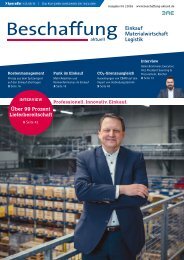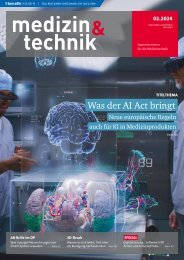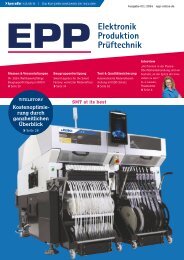cpp – Process technology for the chemical industry 02.2020
The journal cpp - Process technology for the chemical industry reports about processes, plants, apparatus and components for the chemical and pharmaceutical industry. Further topics are IT technologies, industry 4.0, digital production, MSR and automation technology and process analysis technology. The content spectrum is rounded off by explosion protection, plant safety, occupational health and safety, maintenance, site management and energy management.
The journal cpp - Process technology for the chemical industry reports about processes, plants, apparatus and components for the chemical and pharmaceutical industry. Further topics are IT technologies, industry 4.0, digital production, MSR and automation technology and process analysis technology. The content spectrum is rounded off by explosion protection, plant safety, occupational health and safety, maintenance, site management and energy management.
You also want an ePaper? Increase the reach of your titles
YUMPU automatically turns print PDFs into web optimized ePapers that Google loves.
proach to process engineering, an approach<br />
which can be defined as "green engineering":<br />
Engineering in <strong>the</strong> service of green<br />
chemistry.<br />
The implementation of <strong>the</strong> twelve principles<br />
requires, <strong>for</strong> example, that process<br />
engineering goes back to <strong>the</strong> laboratory and<br />
promotes a proactive and highly interdis -<br />
ciplinary exchange between chemists and<br />
engineers.<br />
Energy efficiency<br />
Improving energy efficiency is no easy task<br />
<strong>for</strong> a chemist who develops and evaluates<br />
alternative syn<strong>the</strong>ses on a gram scale in <strong>the</strong><br />
laboratory. Here, <strong>the</strong> engineering tools of<br />
predictive modelling (including <strong>the</strong> analysis<br />
of energy flows and optimisation) and process<br />
simulation are helpful. These instruments<br />
are already available <strong>for</strong> an initial<br />
concept study to obtain in<strong>for</strong>mation on <strong>the</strong><br />
energy needs, environmental impact and<br />
economic conditions of <strong>the</strong> syn<strong>the</strong>sis to be<br />
developed. This allows <strong>for</strong> important decisions<br />
to be made pro-actively and as early<br />
as in <strong>the</strong> R&D phase, which will have a<br />
positive impact on <strong>the</strong> industrial implementation<br />
(e.g. evaluation of alternative separation<br />
processes to increase yield at lower<br />
costs).<br />
VTU has extensive experience in <strong>the</strong> field of<br />
increasing <strong>the</strong> energy efficiency of <strong>chemical</strong><br />
plants. Thanks to <strong>the</strong> know-how of <strong>the</strong> process<br />
engineers, numerous improvements<br />
have become possible that go far beyond<br />
simple heat recovery or known measures<br />
such as pump control. The greatest potential<br />
usually lies in process management. For<br />
example, simple mechanical changes to<br />
guide different feed streams in evaporation<br />
or distillation plants can result in high savings.<br />
At Borealis in Linz, Austria, CO 2 capture<br />
in <strong>the</strong> feed gas <strong>for</strong> ammonia syn<strong>the</strong>sis<br />
was increased by simple means, resulting in<br />
considerable energy savings. The project was<br />
awarded a prize by <strong>the</strong> Austrian Ministry of<br />
Agriculture, Regions and Tourism.<br />
Monitoring of process parameters<br />
Real-time analysis of process parameters<br />
allows <strong>for</strong> <strong>the</strong> timely remedial action to<br />
meet production requirements, reduce byproduct<br />
<strong>for</strong>mation and increase yield,<br />
which is one of <strong>the</strong> targets of a green process.<br />
The effects of relevant measured and<br />
manipulated variables are determined by <strong>the</strong><br />
engineers during <strong>the</strong> development phase, so<br />
that <strong>the</strong>y can <strong>the</strong>n implement optimal and<br />
robust strategies <strong>for</strong> monitoring process<br />
parameters in <strong>the</strong> plant. VTU Engineering<br />
successfully uses <strong>the</strong> combination of quality<br />
SUSTAINABLE SYNTHESIS:<br />
Twelve principles characterise<br />
sustainable syn<strong>the</strong>ses (Anastas<br />
and Warner, 1998):<br />
• Prevent waste<br />
• Atom economy <strong>–</strong> <strong>the</strong> product<br />
of a <strong>chemical</strong> reaction should<br />
have a molecular weight as<br />
close as possible to <strong>the</strong> sum of<br />
<strong>the</strong> molecular weights of <strong>the</strong><br />
starting products, so that few<br />
by-products are <strong>for</strong>med<br />
• Select new, less dangerous syn<strong>the</strong>sis<br />
pathways<br />
• Prefer syn<strong>the</strong>ses of new molecules<br />
without risk to humans<br />
and <strong>the</strong> environment<br />
• Use solvents that are harmless<br />
to humans and <strong>the</strong> environment<br />
by design (QbD) and process analytical<br />
techniques (PAT). With QbD, a test matrix is<br />
specified <strong>for</strong> relevant measured or manipulated<br />
variables, which is statistically evaluated<br />
with PAT and used <strong>for</strong> predictions. This<br />
allows <strong>for</strong> <strong>the</strong> influences and weighting of<br />
<strong>the</strong> process variables on, <strong>for</strong> example, reaction<br />
time, yield, <strong>for</strong>mation of by-products<br />
and, finally, quality to be determined and<br />
validated. QbD and PAT have become widely<br />
used in <strong>the</strong> pharmaceutical sector as <strong>the</strong>y<br />
make an important contribution to speeding<br />
up and rationalising expensive experimental<br />
campaigns. The advantages of <strong>the</strong>se tools can<br />
also be proven in any o<strong>the</strong>r context.<br />
Flexibility is imperative<br />
<strong>Process</strong> engineers today have sufficient tools<br />
available to meet <strong>the</strong> challenges of green<br />
chemistry. However, project planning must<br />
be reviewed on an ongoing basis and<br />
adapted to <strong>the</strong> results achieved after each<br />
development stage. Where appropriate,<br />
more flexibility should be adapted to improve<br />
<strong>the</strong> process as well as to evaluate ways<br />
that are unknown, in order to be able to implement<br />
<strong>the</strong> project competitively on an industrial<br />
scale. VTU has a consolidated concept<br />
<strong>for</strong> sustainable process plants, which<br />
makes use of <strong>the</strong>ir many years of experience,<br />
e.g. with biotechnological processes or<br />
energy recovery. The engineering tools are<br />
adapted to <strong>the</strong> specific requirements of <strong>the</strong><br />
respective project. There are many examples<br />
of how this flexible VTU approach proved to<br />
be decisive <strong>for</strong> increasing client sustainability,<br />
including:<br />
TWELVE CHARACTERISTICS<br />
• Consider energy efficiency in<br />
new syn<strong>the</strong>sis pathways<br />
• Use renewable raw materials<br />
• Reduce derivatives and intermediates,<br />
e.g. avoid protective<br />
groups through better regio -<br />
selectivity or stereoselectivity<br />
• Prefer (bio-)catalytic over stoichiometric<br />
reactions<br />
• Consider later degradation of<br />
new molecules <strong>–</strong> after use,<br />
products should be able to degrade<br />
naturally<br />
• Use real-time monitoring during<br />
production, e.g. to prevent<br />
contamination in <strong>the</strong> process<br />
• Consider safety aspects to prevent<br />
accidents and avoid dangers<br />
• A process evaluation <strong>for</strong> fuel-from-CO 2<br />
• Plants <strong>for</strong> solvent recovery (e.g. ethanol in<br />
pharmaceutical quality, NMP, DMSO)<br />
• The planning of a demonstration plant <strong>for</strong><br />
on-site on-demand H 2 production<br />
• Lithium-ion battery recycling<br />
• The biocatalytic production of plastics<br />
• <strong>Process</strong>es <strong>for</strong> <strong>the</strong> treatment of bio-based<br />
oils <strong>for</strong> use in hydrogenation plants<br />
As a planning partner, VTU also focuses on<br />
research and cooperation. With its own<br />
technical centre and close cooperation with<br />
various institutions, including <strong>the</strong> Graz University<br />
of Technology, <strong>the</strong> engineers are constantly<br />
striving to broaden and improve<br />
<strong>the</strong>ir know-how.<br />
www.<strong>cpp</strong>-net.com<br />
Online search: VTU Engineering<br />
AUTHOR:<br />
WOLFRAM GSTREIN<br />
Managing director,<br />
VTU Engineering<br />
Deutschland<br />
AUTHOR:<br />
ALESSANDRO<br />
ROSENGART<br />
<strong>Process</strong> Engineer,<br />
VTU Engineering Italia<br />
<strong>cpp</strong> 02-2020 11


